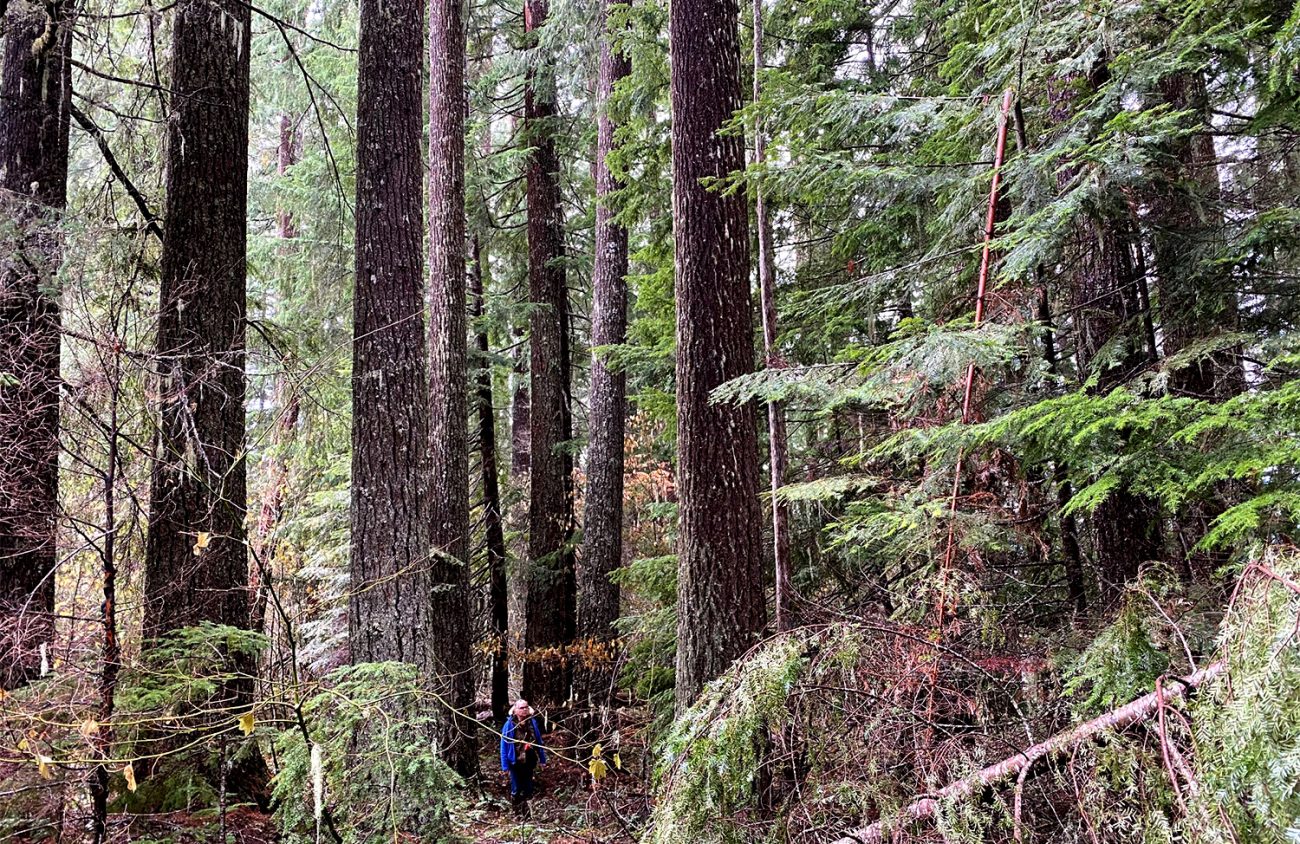During a recent trip to the McKenzie River area, Congressman Peter DeFazio tells Eugene Weekly that he’s seen more logging trucks in that one day than he’d normally see in a year.
But logging trucks could soon haul away more than the controversial Holiday Farm Fire-related salvage timber. The U.S. Forest Service is proposing forest management actions scattered across a project area of 74,091 acres near McKenzie Bridge, according to sale documents. Called the Flat Country Project, the project in the Willamette National Forest concerns opponents who say the agency would be logging mature forests, affecting diverse ecosystems and affecting a space that could be a part of capturing carbon emissions.
“Going into a 100-, 120-year-old forest at this point in time is nuts,” DeFazio says of the sale. “I don’t know what they’re going to do with all this timber.”
According to USFS documents, within the boundaries of the 74,091-acre project, the agency is proposing forest management actions on 5,001 acres. This includes 4,039 acres of forest thinning, 767 of which are on riparian reserves, and 962 acres of regeneration harvests. The project will harvest trees that range in age from 27 to 150 years old.
The proposed logging sale dates back to 2018, and on Jan. 21, 2021, the agency moved forward with the process when it signed its Record of Decision. The sale has four purposes, the USFS says. One is to provide a sustainable supply of timber — about 100 million board feet over five years. The second is to increase the space between trees, which the USFS says are too densely spaced. The third would increase habitat complexity. The fourth is to manage the road system.
Jerry Franklin and Norm Johnson, professors emeritus at University of Washington and Oregon State University, respectively, don’t agree with USFS’s justifications for the logging. Both were involved in developing the 1994 Northwest Forest Plan, which was designed to balance logging while protecting the spotted owl and other species, Johnson tells EW.
In regard to the USFS’s claim on tree density, Franklin says this forest isn’t dense at all but is doing what trees do at a mature stage. The federal agency is applying principles used in managing plantations in declaring that it’s too dense, and that isn’t relevant to a natural forest, he says.
Both Johnson and Franklin say if the sale goes through, it would set a dangerous precedent for future logging projects in mature forests. “These old-growth forests are relatively rare in western Oregon,” Johnson says. “They’re important for a variety of species and for people, too.”
Forests like those found in the Willamette National Forest are optimal for snow capture and retention in the spring, Franklin says. They help produce high quality water and they are effective at regulating water to minimize floods. The USFS is proposing to replace some mature trees with a plantation, he says, which doesn’t provide any of those benefits and actually consumes a lot of water.
DeFazio tells EW that he’s a disciple of Franklin and Johnson. “I agree with what they said. I’ve proposed to the Forest Service and the BLM different ways of doing forestry, following their prescriptions,” he adds.
In a May 7 letter to USFS Chief Vicki Christiansen obtained by EW, DeFazio writes that in a recent trip up the McKenzie Highway, he passed nearly 40 logging trucks. “There is so much salvage harvest and roadside hazard tree removal occurring that some local mills have stopped taking logs,” he says. “In this context, I find it incomprehensible that the United States Forest Service would proceed with the Flat Country Timber Sale to harvest 2,000 acres of mature trees upwards of 100 to 150 years in age.”
He adds in the letter that he sees no reason why the agency should proceed with “clearcutting 2,000 acres of rare mature forest.”
DeFazio tells EW that he doesn’t know if the USFS chief will change her mind, but since she is from the Pacific Northwest, maybe she’ll understand how important the mature forests are.
The Eugene-based nonprofit Cascadia Wildlands agrees that the logging is unnecessary. Conservation Director Bethany Cotton says the group commends DeFazio for speaking out against the Flat Country sale.
“We call on elected leaders at every level to review the science on forest carbon, step forward to protect our forests, and in so doing safeguard our drinking water sources, iconic rivers and watersheds, wildlife habitat and climate,” she says. “Pacific Northwest forests are an essential bulwark of climate resilience — but only if they remain standing.”
Johnson says the Flat Country sale is the largest project the USFS has put together in 20 years, adding “all we can do is ring the fire bell in the night and say, ‘Hey, what a minute here, what is going on?’”
The Willamette National Forest near McKenzie River is one of the last reservoirs of trees, he says, adding that they can’t be replaced. “This is the motherlode of carbon storage,” Johnson says. “It just stands out on a global map. If we’re serious about combating climate change, you’d start with these forests and keeping them.”
To read research by Franklin and Johnson on Flat Country, visit here.
A Note From the Publisher

Dear Readers,
The last two years have been some of the hardest in Eugene Weekly’s 43 years. There were moments when keeping the paper alive felt uncertain. And yet, here we are — still publishing, still investigating, still showing up every week.
That’s because of you!
Not just because of financial support (though that matters enormously), but because of the emails, notes, conversations, encouragement and ideas you shared along the way. You reminded us why this paper exists and who it’s for.
Listening to readers has always been at the heart of Eugene Weekly. This year, that meant launching our popular weekly Activist Alert column, after many of you told us there was no single, reliable place to find information about rallies, meetings and ways to get involved. You asked. We responded.
We’ve also continued to deepen the coverage that sets Eugene Weekly apart, including our in-depth reporting on local real estate development through Bricks & Mortar — digging into what’s being built, who’s behind it and how those decisions shape our community.
And, of course, we’ve continued to bring you the stories and features many of you depend on: investigations and local government reporting, arts and culture coverage, sudoku and crossword puzzles, Savage Love, and our extensive community events calendar. We feature award-winning stories by University of Oregon student reporters getting real world journalism experience. All free. In print and online.
None of this happens by accident. It happens because readers step up and say: this matters.
As we head into a new year, please consider supporting Eugene Weekly if you’re able. Every dollar helps keep us digging, questioning, celebrating — and yes, occasionally annoying exactly the right people. We consider that a public service.
Thank you for standing with us!

Publisher
Eugene Weekly
P.S. If you’d like to talk about supporting EW, I’d love to hear from you!
jody@eugeneweekly.com
(541) 484-0519
